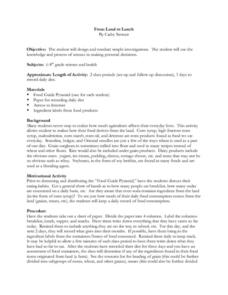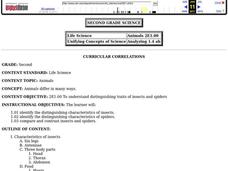Curated OER
Mini Beast Safari Record Sheet
In this bugs and insects in their habitats worksheet, students hunt and locate worms, bugs, and other insects then record their findings to complete the chart.
Curated OER
Plant Diversity
In this nonfiction comprehension worksheet, students read the selection on plant diversity and answer 10 questions that include true/false, short answer, multiple choice, and fill in the blank.
Curated OER
Invertebrates
In this invertebrates activity, high schoolers read about the characteristics of the different groups of invertebrates. Then students complete 10 multiple choice questions.
Curated OER
What Bees Eat
Students study plant and animal interdependence by studying bees and pollination. In this interdependence lesson, students discuss flower parts and dissect it to show its reproductive parts. Students then use tissue and pipe cleaners to...
Curated OER
I Will Survive!
The students will be given approximately five minutes to individually brainstorm general plant and animals adaptations that they already know about. The class will use these as a starting point to develop a KWL chart specific to desert...
Curated OER
A TRIP TO THE CAFETERIA
Students take a "behind-the-scenes" look at the school cafeteria as food is being prepared. They take notes on the jobs (i.e., division of labor) that they observe in the cafeteria. They write about the division of labor in the school...
Curated OER
Energy Forms
Learners explore energy by participating in a science lab in class. For this energy form lesson, students define the different types of energy such as light, mechanical and sound while examining energy measuring tools in class. Learners...
Curated OER
What does AG have to do with me?
Students practice alphabetizing while categorizing sources of basic agricultural products. They discuss agricultrual products, discover where they are grown and draw a simple agricultural scene on poster board.
Curated OER
How to Tame a Field Trip to the Zoo
Keep your pupils focused on field trip learning objectives with before, during, and after activities.
Curated OER
A Rainbow Under the Sea: How Do Animals Survive in the Ocean?
Second graders, with adult help, create a PowerPoint presentation on a selected ocean animal.
Curated OER
From Land to Lunch
Students record their three meals and snacks for three days. They determine which items in their diets are grown on farms and record the items in various categories. They conduct Internet research to determine where carious ingredients...
Curated OER
Ecology - Ecosystem
Third graders research ecosystems, the work of ecologists, John Muir's contribution to the environment and an endangered species of their choice. They read books, participate in discussions, and write reports.
Curated OER
Optimal Foraging
Students participate in a foraging activity that demonstrates environmental conditions playing an important role in determining the optimal foraging behavior of a particular organism.
Curated OER
Egg Carton Coral
Students use egg cartons to construct models of coral colonies showing
many aspects of the coral's natural history - including the structure of
coral polyps and the coral colony's colonial life style.
Curated OER
Color Burst
Students gain experience in asking questions and conducting inquiry by exploring the separation of colors in water and other solvents; to communicate and share findings of student investigations.
Curated OER
Sponges - A Coloring Worksheet
In this sponges worksheet, students read the information about sponges. Students answer the provided questions about the reading passage. Students color the illustration at the bottom of the page.
Curated OER
Birds of Wisconsin
First graders explore the job done by ornithologists. They role play identifying the characteristics that make a bird a bird. They discuss what makes each bird species unique. Students are introduced to Wisconsin's most common and rare...
Curated OER
Digestive System Crossword Puzzle
In this digestive system worksheet, students complete a crossword puzzle with 21 clues pertaining to digestive system vocabulary.
Curated OER
Digestive System Crossword Puzzle Answers
In this digestive system worksheet, students are given the answers to a crossword puzzle with 21 clues pertaining to digestive system vocabulary terms.
Curated OER
Animals
Second graders explore the ways in which animals differ. They discuss the characteristics of insects and spiders. Students identify the characteristics of insects and spiders. They compare and contrast insects and spiders.
Curated OER
Introduction to Gas Chromatography
Students analyze gas chromatograms and suggest various applications for gas chromatography.
Curated OER
The Needs of Living Things
Learners watch video clips of animals and plants in their natural environment, to gather evidence that all living things have basic survival needs. Students draw pictures of real or imaginary pets eating, drinking, breathing, and taking...
Curated OER
Lenses and Mirrors
Learners investigate lenses and mirrors showing how they bend and reflect light waves.
Curated OER
Everyday vs. Extreme Relationships with Nature
Young scholars examine the interactions with nature and the environment. They discover where water comes from and ways to conserve water. They also examine energy sources and consumption.























